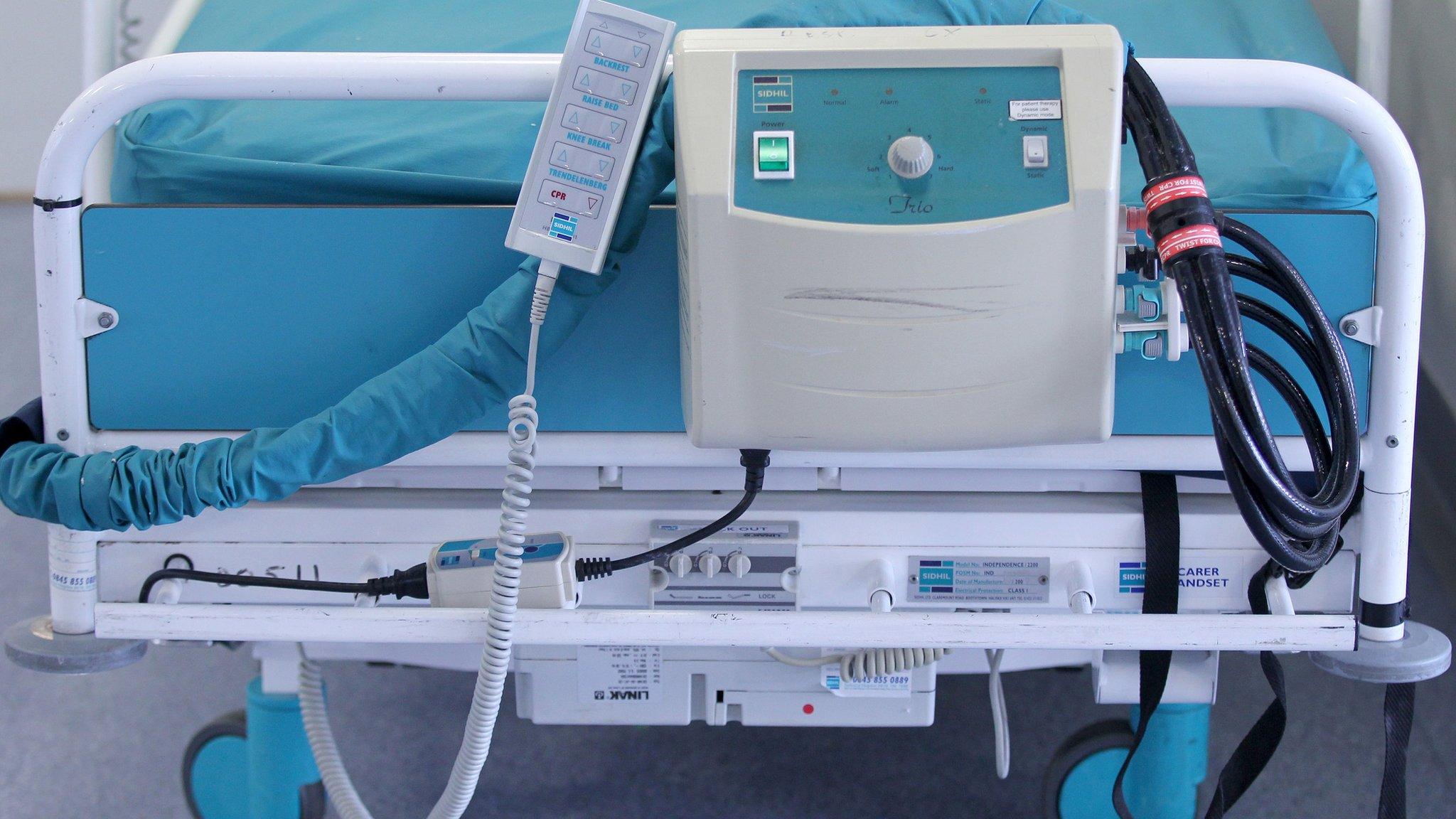Is the NHS in England stuck with soaring demand?
- Published

Staff and residents of care homes are being taught to cook nutritious foods
The latest batch of monthly figures from the NHS in England suggest a service that's struggling to keep up with demand.
Once again, many of the main performance targets - including ambulance response times, delays in A&E, and treatment for cancer - have been missed
All this against a background of increased attendances, more referrals and GPs being busier than ever
So is the NHS is stuck in a never-ending cycle of soaring demand?
The kitchen at Stanborough Lodge care home in Welwyn Garden City is part of the NHS frontline in the fight to ease the strain on hospitals.
The health service has funded training for staff at more than 20 homes in the area in skills such as nutrition and dementia care, and that has affected day-to-day activities such as encouraging residents to help prepare healthy food.
It is one of 50 schemes across England under the "Vanguard" programme - to improve care and highlight ways of working efficiently. There is close support from a GP linked to the home, and a pharmacist, Puja Vyas, who has tackled unnecessary medication.
She said: "They'll be on seven or eight medicines. The most I've seen is 16. There's a lot of things that could have been stopped years ago.
"I've got the time and expertise to go through the medicines they're taking, and say which ones the patient really needs."
Encouraging results
Early results are encouraging. Last month there were no falls. Before the scheme there were about eight a month. Ambulance calls are down more than 30%.
The NHS is pinning a lot on these schemes, which are being trialled in a range of settings.
Nigel Edwards, from health think-tank the Nuffield Trust, says the initial findings from care home vanguards are encouraging, but some other areas have not fared so well.
"There are 400,000 or so people in care homes who constitute a significant amount of activity in emergency and geriatric medicine so that would definitely help.
"But there's also a big demand from younger patients and patients living at home. That's been harder to deal with."
So what is fuelling demand on the NHS? As well as a growing and ageing population, Nigel Edwards points to changing expectations and new treatments for patients who previously would have been beyond help.
Unless the NHS adapts, he says, in the next five years it will need an extra 16,000 beds.
'Boomerang' patients
But there is an argument the health service could manage demand comfortably, if it focussed better on patients' real needs.
Hamish Dibley is an independent healthcare consultant who has worked for several health service trusts. All too often, he says, they confuse rising activity with demand - which he argues is stable and predictable.

Many care home residents are on more medicines than they need, the scheme found
"We've seen everyone who's going to appear in the urgent care system within the first three months of every financial year, and they keep repeating and boomeranging around year on year, until ultimately they die.
He says this is entirely avoidable, if the system re-directs its efforts on what he calls the "vital few".
Seventy-year-old Anthony Rodwell from Berkshire is a classic example of this group.
Last autumn he was told he should have an operation to remove a wisdom tooth. Then he learned he needed major heart surgery, and he was diagnosed with prostate cancer.
Time and again the heart operation has been put back, and the cancer treatment disrupted, because of delays to the tooth procedure. He has been seen at nine different hospitals, culminating in an emergency admission for his heart.
"It seems appalling to me that you'd have to have so many appointments, speak to so many people, travel so many miles to so many different hospitals, to have different tests done. It just seems a terrible waste of resources to me."
Hamish Dibley says this case shows how a failure to get different parts of the system to pull together for the patient only increases activity.
Investments
Nigel Edwards argues the challenge for the NHS is not just to curb admissions: the "bigger win" is in reducing length of stay.
To do that, he says it is vital to invest more in community services and social care so patients can go home promptly. But he is worried.
"The community workforce is ageing. There have been reductions in some areas in numbers of community nurses.
"And I think we're going to have to see the NHS pull its finger out a bit in terms of making those investments."
Whatever differences there may be about why the NHS is so stretched, there is no denying that with money so tight and performance slipping on many fronts, time to find a solution is running out.
- Published5 February 2016

- Published29 January 2016

- Published29 January 2016